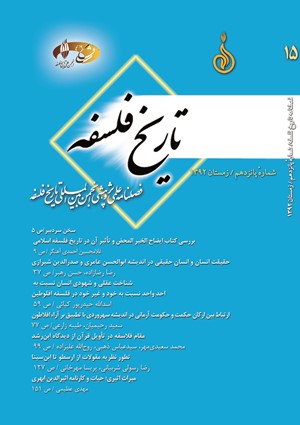شناخت عقلي و شهودي انسان نسبت به احد و احد نسبت به خود و غيرخود در فلسفه افلوطين
محورهای موضوعی : Philosophical thoughts in ancient Iran
1 - مؤسسه پژوهشي حكمت و فلسفه ايران
کلید واژه: افلوطين شناخت عقلي شناخت شهودي توصيفناپذيري بيانناپذيري ,
چکیده مقاله :
مقاله حاضر تحقيقي است در اينباره كه براساس ديدگاه افلوطين آيا انسان ميتواند شناخت برهاني و استدلالي از احد داشته باشد يا خير؟ و آيا ميتواند توصيف و بياني از او ارائه بدهد يا خير؟ همچنين آيا انسان قادر به شناخت شهودي و حضوري از احد هست يا خير؟ احد نسبت به خود از چه نوع شناختي برخوردار است، شناخت عقلي برهاني يا شناخت عقلي شهودي؟ افلوطين بر اين باور است که انسان قادر به تفکر نظري و شناخت عقلي استدلالي از احد نيست و بدينسبب نميتواند توصيف و بياني از او ارائه نمايد ولي انسان در يک شرايط خاص قادر به شهود احد و دريافت حضوري او خواهد بود و بنحوي اتحاد با احد پيدا خواهد کرد. تفکر و انديشه استدلالي که در ذات خود ملازم با کثرت است در احد ذاتاً بسيط و محض راه ندارد، ازاينرو او بنحو شهودي خودآگاه است و چون مبدأ همه چيز است و همه چيز در او حضور دارند، بنحوي که از خود آگاه است از غيرخود نيز آگاه است.
The present paper explores whether, based on Plotinus’ view, man can have a demonstrative and inferential knowledge of the One. It also tries to provide answers to the questions of whether he can describe and explain Him, whether he is capable of having an intuitive and presential knowledge of the One, what kind of knowledge the One has of Himself, and, finally, whether this knowledge is of an intellectual demonstrative nature or of an intellectual-intuitive type. Plotinus believes that man is not capable of attaining a theoretical concept and intellectual-demonstrative knowledge of the One. Therefore, he cannot provide a description and explanation for Him. Nevertheless, he will be able to have intuitive knowledge and presential knowledge of the One under certain conditions. In this case, he will become one with the One in some way. Demonstrative thinking, which is concomitant with plurality in its essence, has no way into the essentially simple and pure One. Accordingly, He is intuitively self-conscious, and since He is the Origin of everything, and since everything is present in Him, He is aware of other than Himself in the same way that He is aware of Himself.
افلاطون، دوره آثار افلاطون، ترجمه محمدحسن لطفي، تهران، انتشارات خوارزمي، ج3، 1380.
افلوطين، دوره آثار فلوطين، ترجمه محمدحسن لطفي، تهران، انتشارات خوارزمي، ج1، و 2، 1366.
ارسطو، متافيزيك، ترجمه شرفالدين خراساني، تهران، نشر گفتار، 1367.
Proclus (1992), Elements of Theology, trans. E.R. Dodds, Oxford, Clarendon Press.
Nikulin, D. (1998), The One and Many in Plotinus, Hermes, 126. Bd. H. 3, pp. 326-340.
Wolfson, H.A. (1947), The Knowability and Describability of God in Plato and Aristotle, Harvard Studies in Classical Philology, vols. 56/57, pp. 233-249.
O’meara, D.J. (1995), Plotinus, An introduction to the Enneads, Oxford University Press. Gerson, L.P. (1998), Plotinus, Routledge, London and New York.
Armstrong, A.H. (1962), Plotinus, Collier Books, New York.
Guthrie, K.S., Numenius, The Father of Neo- Platonism, London, Gorge Bell And Sons.
Plotinus (1969), The Enneads, trans. S. Mackenna London, Faber and Faber Limited.
Plotinus, (1988), Plotinus,VII,EnneadsVI,6-9, trans. A.H. Armstrang, Harward Unversity Pres, London.
Hadot, P. (1988), Commentaire et Notes, in Plotin, Traité 38 (VI,7) , Les E’dtitions Du Cerf, Paris.
Bussanich. J. (2005), Plotinus’s Metaphysics of the One, The Cambridge Companion to Plotinus, edited by Gerson, L.P., Cambridge University Press.
Aristotle, (2011), Aristotle’s Nicomachean Ethics, trans. R. C. Brtlett and S.D. Collins, The University of Chicago Press, Chicago and London.


